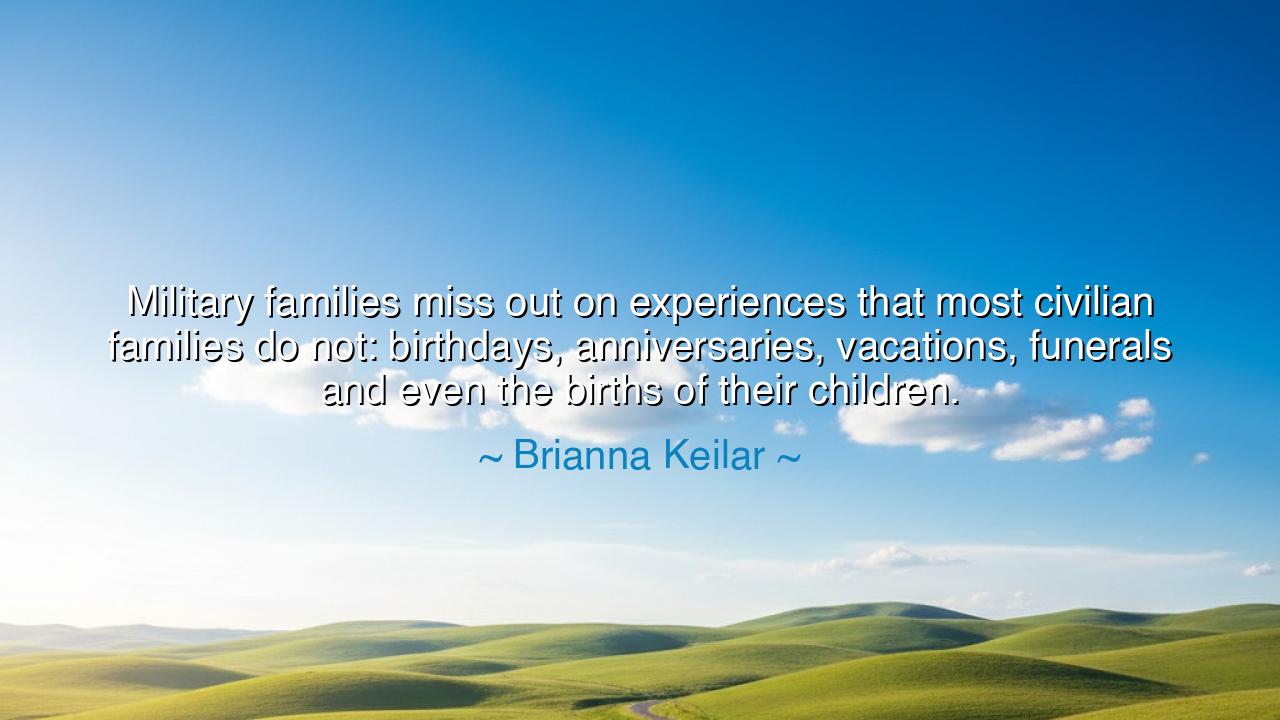
Military families miss out on experiences that most civilian
Military families miss out on experiences that most civilian families do not: birthdays, anniversaries, vacations, funerals and even the births of their children.






Host: The room feels quiet, with the soft glow of the lamp casting a gentle light across the space. Outside, the world has quieted down, creating the perfect atmosphere for a conversation about sacrifice, family, and the realities faced by military families. Jeeny sits on the couch, her legs tucked beneath her, a cup of tea resting in her hands. Jack, standing near the window, gazes out at the darkened world outside, clearly lost in thought.
Jeeny: “Jack, I came across a quote from Brianna Keilar today that made me reflect on the unique sacrifices military families face,” she says softly. “She said, ‘Military families miss out on experiences that most civilian families do not: birthdays, anniversaries, vacations, funerals and even the births of their children.’ What do you think about that?”
Jack: He turns slowly, a thoughtful expression crossing his face. “That’s such a powerful and heartbreaking statement. Keilar is highlighting the deep sacrifices that military families make, often without much recognition. These families are asked to endure separation, sometimes during the most significant moments of life. Celebrations and milestones that most of us take for granted — birthdays, weddings, the birth of a child — can be out of reach for them, and it’s a reminder of the emotional toll that military service takes, not just on the service member, but on their loved ones as well.”
Jeeny: “Exactly. It’s easy to think of military service as something that only affects the person in uniform, but the family is often the one who bears the brunt of those sacrifices. Keilar is pointing out that while soldiers may be physically separated from their loved ones, it’s the families who miss out on those precious moments together. The emotional impact of that kind of absence is profound. You can’t just fill in the gaps of missed birthdays or funerals with phone calls or letters.”
Host: The light in the room seems to deepen as the conversation touches on the unseen sacrifices of military families. Jeeny speaks with an understanding that the sacrifices of military families extend far beyond the battlefield. Jack stands still, reflecting on how the everyday experiences of life — moments of joy, grief, and celebration — become complicated or unattainable when a loved one is deployed or stationed away.
Jack: “It also makes me think about how military families often have to redefine what family life looks like. While civilian families have the privilege of spending holidays, vacations, and milestones together, military families have to make do with virtual connections or sporadic visits. They adapt, they grow resilient, but it’s not easy. And yet, they continue to support their loved ones in the service, understanding the broader mission they’re part of, even when it means missing out on those personal moments.”
Jeeny: “Yes, and it’s that resilience that often goes unnoticed. These families don’t just carry the emotional weight of missing their loved ones, they also carry the emotional labor of holding down the fort, supporting one another, and staying strong in the face of uncertainty. It’s not just about one family member being absent; it’s about the entire family adjusting to a new reality and maintaining strength in moments of great sacrifice.”
Host: The conversation grows richer now, as they reflect on the ways in which military families are affected, not just by the absence of a loved one, but by the constant strain of separation. Jeeny and Jack both agree that the sacrifices of military families are often overlooked or underappreciated, especially in moments of personal loss or celebration. Brianna Keilar’s words remind them that these sacrifices are deep, and the emotional toll is profound, yet these families continue to support their service members without question.
Jack: “I think it also speaks to the unseen nature of these sacrifices. We often see the military members returning home, or hear about their deployments, but we don’t often talk about the families left behind — the spouses, children, parents — who face the emotional strain. The absence of the soldier affects every part of life, from the mundane to the monumental, and it’s something they carry quietly, without asking for much recognition.”
Jeeny: “Exactly. And these sacrifices aren’t just short-term. Military families live with this reality for years, enduring long periods of separation and uncertainty. It’s a kind of endurance that goes unnoticed until we start to really think about the moments they’re missing. It’s easy to take for granted the ability to just be there for a birthday or a funeral, but for these families, it’s a constant battle between duty and love.”
Host: The room feels quieter now, as if the weight of their conversation has settled into something deeper. Jeeny and Jack reflect on the deep sacrifices made by military families, not just in terms of physical separation, but also the emotional toll that separation takes. Brianna Keilar’s words serve as a reminder of the silent sacrifices these families make every day, and the resilience they show in the face of missed milestones, joy, and grief. The emotional cost of military life extends beyond the service member — it affects the entire family, and it’s a sacrifice that deserves recognition and respect.






AAdministratorAdministrator
Welcome, honored guests. Please leave a comment, we will respond soon